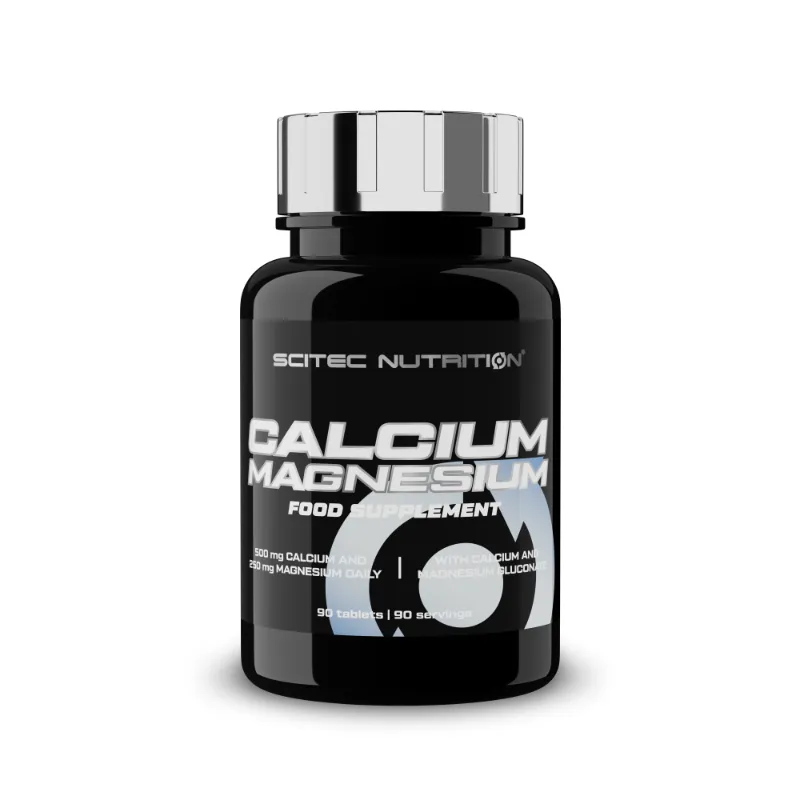Calcium and magnesium. These two nutrients play crucial roles in our bodies, but their significance and interplay are often overlooked or misunderstood. Calcium is perhaps best known for its role in building and maintaining strong bones, but that’s just the tip of the iceberg. Magnesium, on the other hand, might be less well-known, but is no less important. It plays a central role in everything from energy production to nerve function.
Together, calcium and magnesium form a powerful team that supports a range of bodily functions. However, it’s crucial to maintain a healthy balance between the two to ensure optimal health.

Buy our calcium and magnesium here.
Calcium is not only the most abundant mineral in the human body but also a critical component for a number of our most important functions. This fundamental building block is necessary for maintaining our overall health and well-being.
Calcium’s primary role in the body is to support strong and healthy bones. In fact, about 99% of the body’s calcium is stored in bones and teeth, where it contributes to their structure and hardness. But the importance of calcium goes far beyond bone health.
To ensure we get enough calcium, it’s important to include calcium-rich foods in our diet. Here are some of the best sources:
Calcium is a vital building block for our bodies. By ensuring that we get enough of this mineral through a varied diet, we can support our bone health, nerve function, and muscle contraction. Remember to consult a healthcare professional, especially if you are considering calcium supplements, to ensure that you achieve the right balance for your health.
Magnesium is an essential mineral that often doesn’t get the attention it deserves. While many are aware of the importance of calcium and iron, the role of magnesium in the body is just as critical.
Magnesium is crucial for over 300 enzymatic reactions in the body. It plays a key role in a wide range of biological processes, making it an important component for overall health.
Including magnesium-rich foods in your diet is the best way to ensure that you get enough of this important mineral. Here are some excellent sources:
Magnesium is an important, but often overlooked, component of a healthy diet. By including magnesium-rich foods in your daily intake, you can support vital body functions, from muscle and nerve function to bone strength and energy production. Remember, a lack of magnesium can lead to a variety of health problems, so it’s important to be mindful of your intake of this critical mineral.

Calcium and magnesium are two of the most vital minerals for human health, but their interaction in the body is often misunderstood or overlooked. It’s important to understand how these two minerals work together and why maintaining a healthy balance between them is crucial.
Though calcium and magnesium have their unique roles, they are deeply connected and affect each other’s functions in the body. For example:
A proper balance between calcium and magnesium is essential for health. If there is too much of one mineral, it can disrupt the absorption and function of the other. For example, a high intake of calcium can block the absorption of magnesium, while too low an intake of magnesium can lead to a buildup of calcium, potentially leading to issues like kidney stones and, in worse cases, cardiovascular problems.
To achieve a good balance between calcium and magnesium, one should focus on consuming these minerals through a varied diet. It’s generally recommended that the ratio of calcium to magnesium should be around 2:1. However, this can vary based on individual health needs and lifestyle. It’s important to consult a health expert if considering supplements to ensure that you achieve the right balance.
The interplay between calcium and magnesium is crucial for our overall health. By understanding how these two minerals affect each other and ensuring a proper balance between them, we can support our bodies in functioning optimally and prevent potential health problems.
To maintain good health, it’s important to understand how much calcium and magnesium we need daily and how we can achieve these levels through our diet or supplements. This blog post will guide you through the recommended daily doses and provide advice on when supplements may be necessary.
While ideally, it’s best to get these minerals through diet, supplements may be necessary in certain situations:
Achieving the right balance of calcium and magnesium is crucial for your overall health. By understanding the daily recommendations and being mindful of your diet, you can ensure that you meet your bodily needs for these essential minerals. Always remember to consult a healthcare professional before starting supplements, especially if you have underlying health issues or are taking medication.
In summary, calcium and magnesium are two fundamental minerals that play critical roles in our bodies. From supporting bone strength and heart health to regulating muscle and nerve functions, their importance is undeniable. It’s important to understand that while these minerals can be obtained through a well-balanced diet, there may be situations where supplements are needed.
Remember, the key to optimal health lies in maintaining a balance between calcium and magnesium. By following the recommended daily doses and being mindful of your dietary habits, you can ensure that you are effectively supporting your body’s needs. However, always be aware that too much or too little of these minerals can lead to health challenges.
The recommended daily dose of calcium for most adults is 1,000 to 1,200 mg, while for magnesium, it’s 400-420 mg for men and 310-320 mg for women. The requirement can vary depending on age, gender, and health condition.
Yes, it’s possible to consume too much of these minerals, which can lead to health issues. For example, too much calcium can lead to kidney stones, while too much magnesium can cause stomach problems.
If your diet does not provide adequate amounts of these minerals, or if you have a health condition that increases your need for them, supplements may be necessary. It’s best to consult a healthcare professional for personalized advice.
Good sources of calcium include dairy products, green leafy vegetables, and fortified foods. For magnesium, nuts, whole grains, green leafy vegetables, and dark chocolate are good choices.
These two minerals work closely together and influence each other’s absorption and function in the body. An imbalance between them can disrupt their respective health benefits.
Children need adequate amounts of calcium and magnesium for growth and development. Supplements should only be considered after consultation with a pediatrician, especially if the child has specific nutritional needs or health conditions.
To maintain a good balance, focus on consuming a varied diet that includes foods rich in these minerals. If considering supplements, discuss this with a healthcare professional to avoid imbalance.
Yes, conditions such as osteoporosis, heart diseases, and certain digestive diseases may require special attention to the intake of calcium and magnesium. It’s important to discuss this with a healthcare professional to get the best advice.
© 2024 Only Approved – Designed by Aveo web&marketing
Socials
Socials